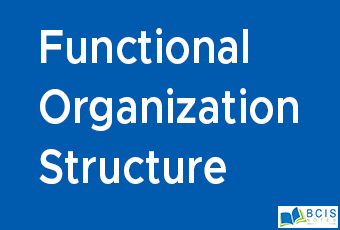
Functional Organization Structure
The functional organization structure is very much based on the philosophy of functional foremanship scheme. F.W. Taylor, the father of scientific management, initiated the concept of a functional organization under the scheme of functional foremanship. However, in practice, the functional organization concept is limited only to the top-level management and not implemented at the subordinate level.
According to,” F.W. Taylor, the father of scientific management, initiated the concept of a functional organization under the scheme of functional foremanship”.
Generally, in a functional organization, functional specialists communicate with each other through the general manager. Here no functional specialist can provide direct instruction or suggestions to another functional specialist. Its advantages and disadvantages are listed below:
Advantage of functional organization
The following are some points of advantages of functional organizations:
1. Benefits of specialists
The functional organization structure provides the benefits of functional specialization. Every manager is an expert in his own field of knowledge. The expertise of every manager is beneficial to all the members as well as to the enterprise.
2. Increase efficiency
Each department of the enterprise is under the supervision of a functional specialist. The top-level management makes a decision by taking suggestions, advice, and guidance from functional specialists. It helps in taking the right decision.
3. Healthy competition among experts
A functional organization structure gives importance to functional specialization. Here, the management makes the recruitment, selection, appointment, and placement of the managers on the basis of their specializations. Besides, a functional organization encourages healthy competition among functional experts.
4. Relief to executives
In a functional organization, work is divided on the basis of functional specialization. Under this structure, managers are not over-burdened with the maximum workload as in the case of line organization. Here, every manager has to work in one line of activity where he has a functional specialization.
5. Mass production
There is a provision of functional specialization and standardization in work in functional organizations. This contributes to developing the working efficiency of both the executive and subordinate level members.
6. Facilitates growth and expansion
The functional organization structure provides a preference for growth and expansion of business activities. It creates scope for the existing volume of business to grow and also for the expansion of various lines of business. Each and every executive is an expert in his own sector.
7. Suitable for the present environment
The functional organization structure is suitable for the management of large scale business enterprises in the present-day environment. The development of production volume, expansion of markets, customers, government regulation, etc. create a new and challenging environment in business activities.
Disadvantages Of Functional Organization
The following are some disadvantages of functional organization:
1. Multiple command system
The lack of unity of command in the major limitation of functional organization structure. The subordinates are always in confusion to obey orders because they receive more than one order at a time.
2. Lack of coordination
Every department of the enterprise is given to a functional specialist. The department heads are independent to perform their departmental works. There is no provision of the formal relationship among the departmental specialists.
3. High administrative cost
The functional organization needs more administrative costs. In such an organization, many functional specialists are appointed in various departments. The functional experts are to be paid more remuneration. So, it is impossible to minimize cost and maintain higher efficiency in operations.
4. Delay in decision-making
Quick decisions and prompt implementation are the present-day needs of a business organization. However, in a functional organization, there is no possibility of quick decisions. It is essential to take suggestions and guidance from experts before making a decision.
5. Spoils human relations
In a functional structure, it is more difficult to maintain a mutual relationship among members of the organization. There is complexity in the relationship between the superiors and the subordinates which spoils human relationships in the enterprise.
6. The narrow outlook of specialists
The narrow vision of departmental specialists creates problems in functional organizations to achieve the overall objectives of the enterprise. The departmental specialists are more concerned about the efficient functioning of their respective functional areas.
7. Shifting responsibility
Fixing a definite responsibility for the functional specialist or a subordinate is difficult in this type of organization. There is a lack of unity of command and everyone wants to shift the responsibility of unsatisfactory works to others. Such an environment creates problems in achieving defined objectives.
You may also like Types Of Organizational Design

Leave a Reply